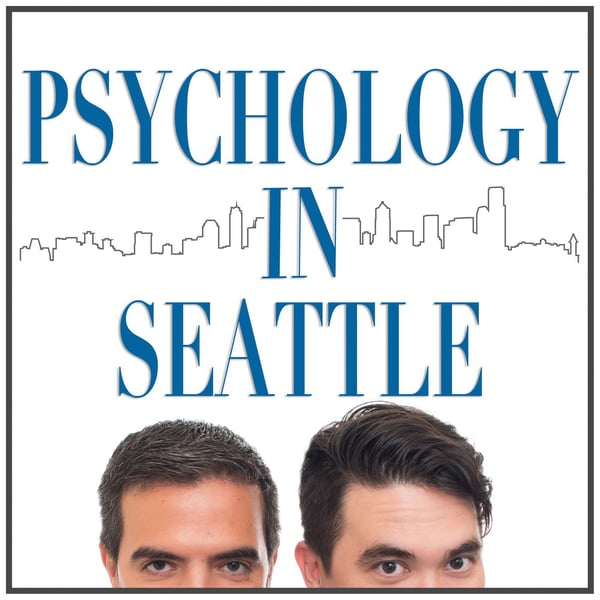Emotional Awareness and Jealousy
Psychology In Seattle Podcast
Kirk Honda
4.6 • 1.2K Ratings
🗓️ 14 April 2021
⏱️ 72 minutes
🧾️ Download transcript
Summary
Become a patron: https://www.patreon.com/PsychologyInSeattle
Email: https://www.psychologyinseattle.com/contact
Get merch: https://teespring.com/stores/psychology-in-seattle
Dr. Kirk’s Cameo: https://www.cameo.com/kirkhonda
Instagram: https://www.instagram.com/psychologyinseattle/
Discord: https://discord.gg/6QR4sE8x9K
Reddit: https://www.reddit.com/r/PsychologyInSeattle/
Twitter: https://twitter.com/PsychInSeattle
Facebook Official Page: https://www.facebook.com/PsychologyInSeattle/
Facebook Fan Page (run by fans): https://www.facebook.com/groups/112633189213033
The Psychology In Seattle Podcast ®
Trigger Warning: This episode may include topics such as assault, trauma, and discrimination. If necessary, listeners are encouraged to refrain from listening and care for their safety and well-being.
Disclaimer: The content provided is for educational, informational, and entertainment purposes only. Nothing here constitutes personal or professional consultation, therapy, diagnosis, or creates a counselor-client relationship. Topics discussed may generate differing points of view. If you participate (by being a guest, submitting a question, or commenting) you must do so with the knowledge that we cannot control reactions or responses from others, which may not agree with you or feel unfair. Your participation on this site is at your own risk, accepting full responsibility for any liability or harm that may result. Anything you write here may be used for discussion or endorsement of the podcast. Opinions and views expressed by the host and guest hosts are personal views. Although, we take precautions and fact check, they should not be considered facts and the opinions may change. Opinions posted by participants (such as comments) are not those of the hosts. Readers should not rely on any information found here and should perform due diligence before taking any action. For a more extensive description of factors for you to consider, please see www.psychologyinseattle.com
This show is part of the Spreaker Prime Network, if you are interested in advertising on this podcast, contact us at https://www.spreaker.com/show/3269717/advertisement
Transcript
Click on a timestamp to play from that location
| 0:00.0 | So Bob we have a bunch of emails about preoccupied attachment and borderline and other kinds of things |
| 0:07.9 | and I grouped them together from the patrons and I thought we would read them on the air and |
| 0:12.6 | answer them. What do you say Bob? Let's read them. This is the Psychology and Seattle podcast. I'm |
| 0:17.6 | your host Dr. Kirk Honda. I'm a therapist and a professor. Who are you Bob? I am Bob. I'm your |
| 0:23.0 | friend from graduate school, a therapist in practice here in Seattle. Yeah. So before we get into |
| 0:27.7 | things, just major trigger warning as with all of our episodes. We get into various different |
| 0:32.8 | difficult topics. So be warned and if we get into an issue that you think, oh this might trigger me, |
| 0:39.5 | I would recommend turning it off. So okay. Upper tier patron Joyce from Los Angeles, she says, |
| 0:46.7 | does a path to recovery from borderline personality disorder have to begin as a solitary journey? |
| 0:53.9 | I often get the impression that in order to be a secure adult, one has to be able to establish |
| 0:59.9 | that secure base within themselves by themselves. Is this born from Western idealization of independence? |
| 1:07.6 | This can often feel painfully lonely especially during the pandemic. Bob, what do you think? |
| 1:12.4 | I think it's a great question and I think the answer, the short answer is yeah it might be a |
| 1:17.6 | response to the way we in Western, whatever culture value independence, but it's not realistic. |
| 1:26.4 | I think that you can't develop secure attachment by yourself. Like you actually need a |
| 1:33.6 | relationship and a corrective experience in the relationship in order for that to actually happen. |
| 1:37.4 | So okay, so you know I do this thing called DBT and it's aimed at helping people with |
| 1:48.4 | borderline personality disorder and it's good. It's all been lots of good data behind it. It's been |
| 1:52.5 | researched and it's shown to be effective, but DBT is a talk therapy which means that there is a |
| 1:59.6 | relationship with a personal counselor and then there's this group skills training. But let's |
| 2:03.1 | let that go for just a second. In the relationship with the personal counselor is the arena for |
| 2:08.7 | corrective experience. Now it turns out that by that by itself that is probably insufficient to |
... |
Please login to see the full transcript.
Disclaimer: The podcast and artwork embedded on this page are from Kirk Honda, and are the property of its owner and not affiliated with or endorsed by Tapesearch.
Generated transcripts are the property of Kirk Honda and are distributed freely under the Fair Use doctrine. Transcripts generated by Tapesearch are not guaranteed to be accurate.
Copyright © Tapesearch 2025.

